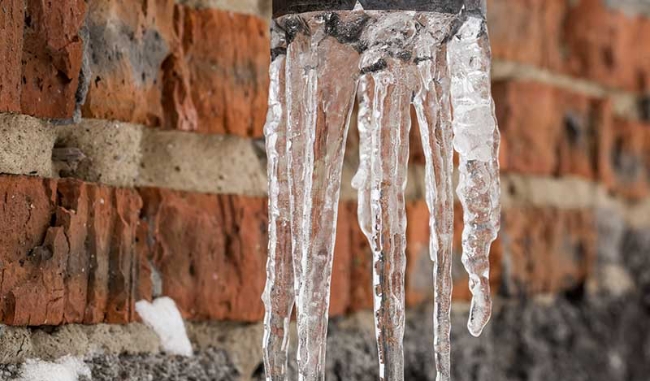Crucial Advice for Preventing Frozen Plumbing in Cold Weather Seasons
Crucial Advice for Preventing Frozen Plumbing in Cold Weather Seasons
Blog Article
Any individual seems to have their own unique theory on the subject of Prevent Frozen Pipes .

Winter can ruin your plumbing, particularly by freezing pipes. Right here's how to prevent it from occurring and what to do if it does.
Introduction
As temperature levels decline, the threat of frozen pipelines increases, possibly causing expensive repair work and water damage. Understanding just how to prevent icy pipelines is essential for property owners in cool environments.
Avoidance Tips
Shielding at risk pipes
Cover pipes in insulation sleeves or make use of heat tape to secure them from freezing temperatures. Concentrate on pipes in unheated or external areas of the home.
Home heating techniques
Maintain interior spaces adequately heated, specifically locations with plumbing. Open up cupboard doors to enable warm air to distribute around pipelines under sinks.
How to recognize icy pipelines
Search for lowered water flow from faucets, uncommon odors or sounds from pipelines, and visible frost on revealed pipes.
Long-Term Solutions
Structural changes
Consider rerouting pipelines away from exterior walls or unheated areas. Add extra insulation to attics, cellars, and crawl spaces.
Updating insulation
Purchase high-grade insulation for pipelines, attic rooms, and walls. Proper insulation aids preserve consistent temperature levels and lowers the danger of icy pipes.
Shielding Outside Pipes
Garden hoses and outside faucets
Detach and drain yard hose pipes prior to winter season. Mount frost-proof spigots or cover outside taps with insulated caps.
Recognizing Icy Pipes
What triggers pipelines to freeze?
Pipes ice up when revealed to temperatures below 32 ° F (0 ° C) for prolonged durations. As water inside the pipelines ices up, it expands, putting pressure on the pipe wall surfaces and potentially triggering them to rupture.
Dangers and problems
Frozen pipelines can result in water supply disruptions, property damage, and pricey repairs. Burst pipelines can flood homes and trigger considerable structural damages.
Signs of Frozen Pipes
Recognizing frozen pipelines early can prevent them from rupturing.
What to Do If Your Pipes Freeze
Immediate actions to take
If you presume frozen pipes, keep taps open up to alleviate pressure as the ice melts. Utilize a hairdryer or towels soaked in hot water to thaw pipelines gradually.
Final thought
Preventing frozen pipelines needs positive steps and quick actions. By understanding the reasons, signs, and safety nets, property owners can secure their pipes during winter.
Helpful Tips to Prevent Frozen Pipes this Winter
UNDERSTANDING THE BASICS: WHY PIPES FREEZE AND WHY IT’S A PROBLEM
Water freezing inside pipes is common during the winter months, but understanding why pipes freeze, and the potential problems it can cause is crucial in preventing such incidents. This section will delve into the basics of why pipes freeze and the associated problems that may arise.
THE SCIENCE BEHIND FROZEN PIPES
When water reaches freezing temperatures, it undergoes a physical transformation and solidifies into ice. This expansion of water as it freezes is the primary reason pipes can burst. As the water inside the pipe freezes, it expands, creating immense pressure on the walls. If the pressure becomes too great, the pipe can crack or rupture, leading to leaks and water damage.
FACTORS THAT CONTRIBUTE TO PIPE FREEZING
Low Temperatures: Extremely cold weather, especially below freezing, increases the risk of pipes freezing. Uninsulated or Poorly Insulated Pipes: Pipes located in unheated areas, such as basements, crawl spaces, or attics, are more prone to freezing. Insufficient insulation or lack of insulation altogether exacerbates the problem. Exterior Wall Exposure: Pipes running along exterior walls are susceptible to freezing as they encounter colder temperatures outside. Lack of Heating or Temperature Regulation: Inadequate heating or inconsistent temperature control in your home can contribute to frozen pipes. PROBLEMS CAUSED BY FROZEN PIPES
- Pipe Bursting: As mentioned earlier, the expansion of water as it freezes can cause pipes to burst, resulting in significant water damage.
- Water Damage: When pipes burst, it can lead to flooding and water damage to your property, including walls, ceilings, flooring, and personal belongings.
- Structural Damage: Prolonged exposure to water from burst pipes can compromise the structural integrity of your home, leading to costly repairs.
- Mold and Mildew Growth: Excess moisture from water damage can create a favorable environment for mold and mildew growth, posing health risks to occupants.
- Disrupted Water Supply: Frozen pipes can also result in a complete or partial loss of water supply until the issue is resolved.
WHY CERTAIN PIPES ARE MORE PRONE TO FREEZING
- Location: Pipes located in unheated or poorly insulated areas, such as basements, crawl spaces, attics, or exterior walls, are at higher risk of freezing.
- Exterior Pipes: Outdoor pipes, such as those used for irrigation or exposed plumbing, are particularly vulnerable to freezing as they are directly exposed to the elements.
- Supply Lines: Pipes that carry water from the main water supply into your home, including the main water line, are critical to protect as freezing in these lines can affect your entire plumbing system.
- Underground Pipes: Pipes buried underground, such as those connected to sprinkler systems or outdoor faucets, can be susceptible to freezing if not properly insulated.
https://busybusy.com/blog/helpful-tips-to-prevent-frozen-pipes-this-winter/

I came across that write up on Preventing and dealing with frozen pipes while doing a search on the web. I beg you pause to share this blog if you liked it. I thank you for your readership.
Book An Estimate Now Report this page